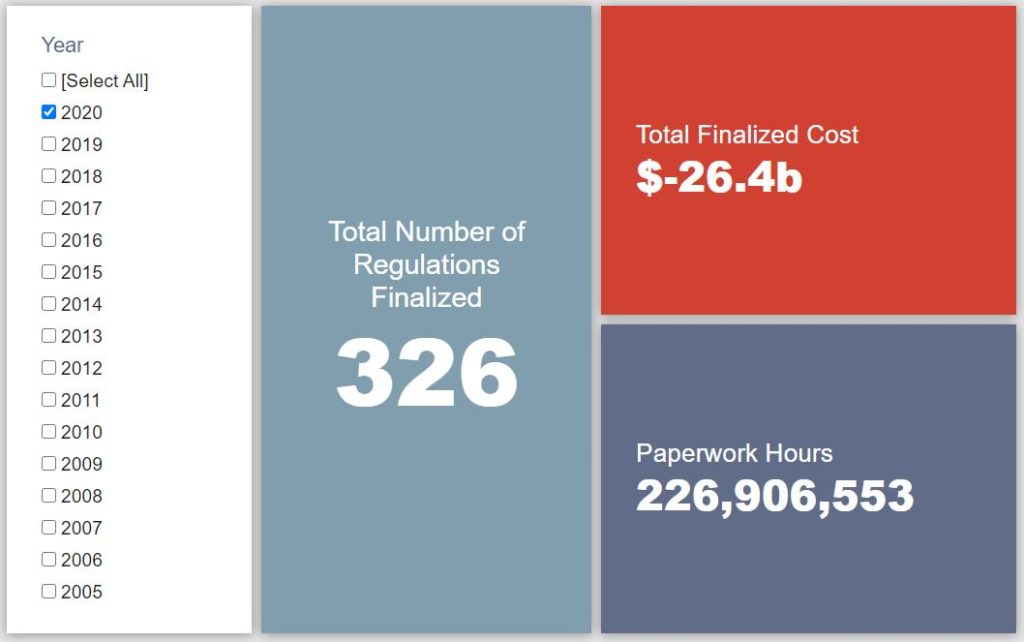Week in Regulation
October 19, 2020
EPA Rule Leads Deregulatory Week
Following a three-week stretch that included billions and billions and billions of dollars in net costs, this past week saw rulemaking balance shift back to the cost-cutting side. An Environmental Protection Agency (EPA) rule finalizing changes to “effluent limitations guidelines and standards” for power plants provided the bulk of the estimated savings. Across all rulemakings, agencies published $2.5 billion in total net cost savings but added 276,597 hours of annual paperwork.
REGULATORY TOPLINES
- Proposed Rules: 41
- Final Rules: 71
- 2020 Total Pages: 66,118
- 2020 Final Rule Costs: -$26.4 billion
- 2020 Proposed Rule Costs: $15.7 billion
TRACKING THE REGULATORY BUDGET
The most significant rulemaking of the week with regards to the fiscal year (FY) 2021 regulatory budget was EPA’s “Steam Electric Reconsideration Rule.” The rule makes revisions to a 2015 rule on the matter. As EPA explains: “Since the Steam Electric Power Generating [effluent limitations guidelines and standards] were revised in 2015, steam electric power plants have installed more affordable technologies that can remove similar amounts of pollution as those operating in 2015. This final rule revises limitations and standards for two of the wastestreams addressed in the 2015 rule: BA transport water and FGD wastewater.” The agency estimates that such changes could save affected facilities roughly $153 million per year.
Since last week was the first full week of the fiscal year, the administration’s new FY 2021 regulatory budget caps are still forthcoming. So far into FY 2021, however, agencies have officially published 9 deregulatory actions and 4 regulatory actions, totaling $2.2 billion in quantified total net costs. The American Action Forum’s review of the administration’s FY 2020 regulatory budget progress can be found here.
THIS WEEK’S REGULATORY PICTURE
This week, the Federal Maritime Commission (FMC) aims to set a new policy for how cruise operators handle refunds.

Source: https://www.federalregister.gov/documents/2022/03/17/2022-05568/passenger-vessel-financial-responsibility
In the October 14 issue of the Federal Register, the FMC published an advanced notice of proposed rulemaking (ANPRM) seeking public input on how it should standardize when and how cruise operators issue refunds for cancelled or delayed voyages.
In light of many trip cancellations due to COVID-19, which were mandated by the Centers for Disease Control and Prevention (CDC) in March, cruise operators adopted various policies for whether to issue refunds. Some cited a government order to cease operations as a situation beyond an operator’s control to deny refund in certain cases.
In the ANPRM, the FMC says it is considering more specific regulatory language on how refunds should be handled in these instances. It says it wants to define “nonperformance of transportation” – essentially, the threshold for when a refund would be available – as canceling a voyage or a delay in the boarding of passengers by more than 24 hours if the passenger declines to board a substitute or delayed voyage. Either of these scenarios would mandate a refund within 180 days from when the passenger requests one.
The FMC is also proposing to require refunds to be made in the same form as the payment from the passenger, limiting the ability of operators to offer credit for future travel as a refund.
The FMC seeks public comment on the proposed changes before it offers official proposed regulatory text, which would occur in a more standard notice of proposed rulemaking.
The current no-sail order for cruise operators is in effect until October 31, though the CDC is likely to extend it a fourth time as the COVID-19 pandemic continues to be public health emergency.
TOTAL BURDENS
Since January 1, the federal government has published $10.8 billion in total net cost savings (with $26.4 billion from finalized rules) and 279 million hours of net annual paperwork burden increases (with 226.9 million hours due to final rules). Click here for the latest Reg Rodeo findings.












